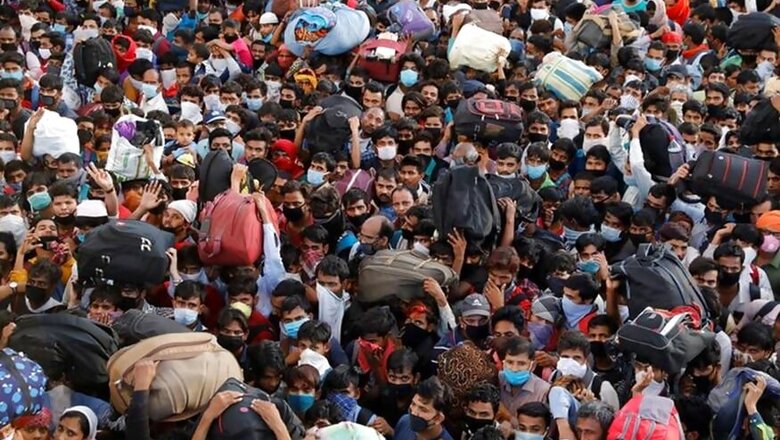
views
Patna: Bihar is sitting on a powder keg. Thousands of workers from the state have rushed back from different parts of the country, including the capital, on foot or by whatever means of transport they could find to be with their families after the Prime Minister announced a 21-day nationwide lockdown to contain the novel coronavirus outbreak.
Two deaths related to Covid-19 have been recorded and over a dozen have tested positive so far in different parts of Bihar, India's most densely populated state where more than 10 crore people live. Chief minister Nitish Kumar had declared a lockdown three days before the Centre's order of March 24.
Sensing the potential danger, the Bihar government has taken measures to keep the visiting population from Delhi and elsewhere in mandatory quarantine for 14 days in isolation camps near the borders with Uttar Pradesh, Jharkhand, West Bengal and Nepal.
If social contacting is not effectively checked, the virus will spread in geometrical progression, engulfing the state, where many people are not very health conscious and there aren't adequate medical facilities and requisite infrastructure in urban as well as in rural areas.
The CM has expressed concerns over the danger of community transmission and observed that sending over migrant workers was tantamount to gross violation of the countrywide lockdown and defeated the very purpose of isolating people.
The exodus of workers has already led to a blame game between Nitish Kumar and his counterpart in Delhi, Arvind Kejriwal.
Bihar water resources minister Sanjay Jha, who is part of the state’s crisis management group, said that the lockdown has failed here due to the Arvind Kejriwal and Uttar Pradesh's Yogi Adityanath governments providing buses for ferrying thousands of migrant workers into the state. While the Centre has ordered states to implement the lockdown and a compulsory 14-day quarantine for the home-bound migrants, the situation on Bihar borders is explosive with people sporadically becoming violent.
Migration is a common phenomenon in Bihar – both within the state and from the state to other parts of the country by people searching for livelihood. According to a study by the International Growth Centre, the vast majority of migration in Bihar is by vulnerable groups engaged in labour-intensive work. Fewer people moving out of Bihar take up agricultural work than in the past, and are increasingly turning towards the construction sector instead.
Since a majority of the migration from Bihar to other states is cyclical, people are often unable to access their social entitlements when they are working away from home. The study suggests that migrants should be able to access their social and political rights anywhere in the country to enhance the welfare benefits of labour migration.
The remittances are a crucial aspect of migration as the families of the workers are heavily dependent on the quantum of fund remitted to them. According to a report, Bihar gets substantial remittances from other parts of the country and abroad from migrants.
Though it may seem inhumane to stop such desperate migrants at quarantine camps near the borders given the virulence factor of Covid-19, the Bihar government is not fully-equipped to deal with the situation if the cases multiply in geometric progression and enter community level.
The government claims to have developed a three-tier public health infrastructure based on predetermined population norms. The monthly average number of patients visiting government hospitals has increased substantially from 9,927 in 2015 to nearly 10,000 in 2019. Such large number of footfalls in government hospitals is the result of comprehensive health services with provisions of free medicines and quality care, a bureaucrat said.
According to official data, there are only nine government medical colleges and hospitals, 533 primary health centres, 1,399 additional primary health centres and 9,949 sub-health centres in the state. Besides, there are 37 district hospitals, 55 sub-divisional hospitals and 70 referral hospitals.
Ever since the migrants began returning home, the state government has procured 15,000 thermal screening kits and a directive has been issued to authorities to convert schools and Panchayat Bhawans into quarantine centres.
Since the state-run hospitals have only 390 specialist doctors, 469 general doctors and 566 nurses, the Nitish Kumar government has asked private hospitals to stop OPD services and remain prepared for coronavirus patients. The doctors on duty have sought their isolation because some of them have showed symptoms of coronavirus. They complained of acute shortage of protective kits, masks and ventilators to deal with the situation in times of exigency.
Past experiences regarding acute respiratory infections show that the number of such cases stood at 10 lakh in 2018-19 followed by 8.2 lakh cases of 'fever of unknown origin'. In 2019, over 170 children died due to Acute Encephalitis Syndrome (AES) in Muzaffarpur district and adjoining areas in Bihar.
The AES deaths came as an embarrassment for Nitish Kumar, who ordered construction of a paediatric intensive care unit at the Sri Krishna Medical College and Hospital (SKMCH) to deal with such cases. The AES is again knocking on the door amid the Covid-19 scare and a child reportedly died on Monday at the hospital, exposing the preparedness of the government.
The low income of the majority of the population in Bihar leads to its dependence on public health services, but the seriousness of the government to create health infrastructure can be ascertained by the fact that the National Health Mission funds have so far been under-utilised while only half of the Rs 3,300 crore state health budget has been spent.
(The author is a senior journalist. Views expressed are personal)




















Comments
0 comment